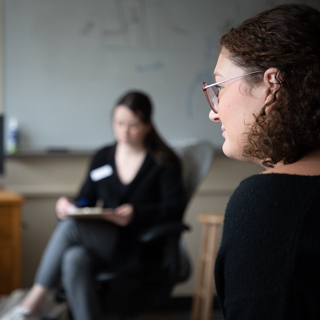Sydnie Benjelloun

OUTSTANDING AFI – QUESTIONS:
What degree(s) do you have and where did you earn it (them)?
I hold a B.S. in Psychology through Missouri Southern State University, and am currently pursuing my graduate degrees in Psychology and in Neuroscience.
What is your current role at your organization?
Social Services Director, The Village Health and Rehabilitation Center, Missoula, MT
How did you come to work at your organization?
After getting my degree in Psychology, I spent time as a Behavior Therapist for autistic children and teenagers. After a few years of behavior therapy, I made a shift to House Management for group homes of disabled, young adults working towards independence. My passion for deeper, mental-health-related work lead me to Crisis Counseling, specializing in suicide, mental illness, and, of course, various crises. The strong feeling of readiness to get out of my fishbowl hometown prompted a move to the great Big Sky of Montana in the midst of a pandemic in 2020. A Behavioral Specialist position was secured to me on arrival; however, due to the pandemic, lay-offs were transpiring all around. Unfortunately, I was not immune to that. Within approximately 6 weeks, I was a part of a large body of employee cuts that had come from the major mental health organization with which I was employed… I took this disappointing situation as an opportunity for a mental health refresher, and took nearly a month off to explore the new region where I now resided. When I was ready to go back to work, I had no idea an assemblage of mental health workers were also looking for recruitment. It came to be quite difficult to find a place of employment – I had become desperate after close to another month of unemployment. I came across a Life Enrichment Activities (LEA) Aide position for a Skilled Nursing Facility. I had never worked with the elderly, but it seemed like I would be able to assist with increasing quality of life, while still putting my degree to use, so I applied. It was a significant pay cut to what I had been used to, but, as I said – I had reached desperation. I walked into The Village Health and Rehabilitation, ready for my interview with the LEA department. The interview was quite brief; the Director of LEA informed me that the Executive Director and the Social Services Director were waiting for me in the office next door. In a turn of events, the Social Services Director was leaving, and they were in search of a replacement. When they had come across my résumé, one might say that fate had placed me in the interview chair. Apparently, the previous Social Services Director had also come from LEA – there is a running joke that the Social Services Department is only staffed by stealing from LEA.
What do you appreciate most about supervising practicum students?
I am largely appreciative of the learning, guiding, and giving back that this experience has gifted me. Some of my favorite conversations during practicum have involved recognizing an area or opportunity of growth in my intern(s), and, by the end of the conversation, realizing that I also learned from the moment. I’ve been able to explore my own guidance style, and healthfully acknowledge areas that might need growth, while affirming other areas in which I might be excelling. There were times, in my own undergraduate trek, when I felt wildly overwhelmed; it became especially challenging and demanding as I neared graduation. During those especially challenging and demanding times, there were people who gently reached out their hand and said ‘I want to help you’, met me where I was in my organized disarray, and remained genuinely invested in helping me succeed. This opportunity has allowed me to be that for someone else, to really lean into that role, and provide even more support than I may have received. It has been extremely rewarding to learn from my intern(s), watch them prosper, and be a part of that prosperity for just a few steps of their running staircase that brought them to this point in their exploration of life. I am very appreciative of this intricate experience.
What does being a social worker mean to you?
Being a social worker might look a little different to me than how it might look to someone who graduated with a degree in social work, but it feels generalizable I’d like to think. As a social worker, my goal is to ensure the improvement of quality of life for my clients, similar to the goal of my co-workers, and many other occupations. It is specifically, though, a social worker’s responsibility to monitor each discipline’s ability and intentions of making that improved quality of life come to fruition. Social workers facilitate justice, healing, protection, and so, so, so much more.
How does your role as a social worker relate to your role as a supervisor?
The responsibilities that come with being a social worker easily translate into the responsibilities that come with being a supervisor. My ability to advocate for my staff, intern(s), etc. is enhanced by understanding the respect and humane treatment that a fellow human being deserves in the workplace. As a supervisor, I am able to create a healthy, fun, safe, and understanding work environment that I might not have received, or workers before me might not have received, while harvesting the benefits of having healthy staff – healthy and positive job performance, and, of course, healthy staff.
What is the most important thing you hope your practicum students take with them into their careers?
I think the most important thing anyone can learn and continue to grow in is that there are myriads of versions of perspectives on an ever-evolving world with our ever-evolving minds. Expand on your ability to empathize, and remember that your personal growth is a continuum. Do your best when you are able, and learn from the times when you are not. Take advantage of the fire you have to help others, and recognize when you need a break before the fire burns out.
What is your favorite quote that exemplifies social work?
‘Peace is the only battle worth waging.’ Albert Camus
Any final words of wisdom?
You matter. And so do they. Your compassion is needed for yourself, first and foremost, and then for those who need the life you have to give. Humble yourself. Admit when you need to grow, recognize the mistakes you’ve made, and the achievements you’ve obtained, and always be willing to learn. Give your all, as able - rest, as able - find a peaceful medium, as able. Know when to ask questions or ask for help, but also acknowledge your ability to be independent in difficult (but honorable) decision-making. Listen, learn, and love. You will find that they are wrong when they say ‘this is a thankless job’. This is not a thankless position, but an overwhelmingly thankful one.
